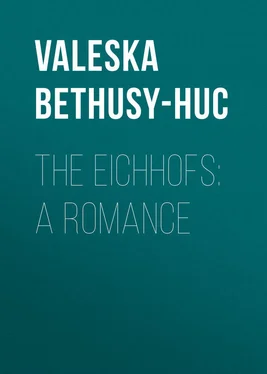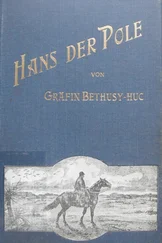Valeska Bethusy-Huc - The Eichhofs - A Romance
Здесь есть возможность читать онлайн «Valeska Bethusy-Huc - The Eichhofs - A Romance» — ознакомительный отрывок электронной книги совершенно бесплатно, а после прочтения отрывка купить полную версию. В некоторых случаях можно слушать аудио, скачать через торрент в формате fb2 и присутствует краткое содержание. ISBN: , Жанр: foreign_antique, foreign_prose, на английском языке. Описание произведения, (предисловие) а так же отзывы посетителей доступны на портале библиотеки ЛибКат.
- Название:The Eichhofs: A Romance
- Автор:
- Жанр:
- Год:неизвестен
- ISBN:http://www.gutenberg.org/ebooks/35311
- Рейтинг книги:3 / 5. Голосов: 1
-
Избранное:Добавить в избранное
- Отзывы:
-
Ваша оценка:
- 60
- 1
- 2
- 3
- 4
- 5
The Eichhofs: A Romance: краткое содержание, описание и аннотация
Предлагаем к чтению аннотацию, описание, краткое содержание или предисловие (зависит от того, что написал сам автор книги «The Eichhofs: A Romance»). Если вы не нашли необходимую информацию о книге — напишите в комментариях, мы постараемся отыскать её.
The Eichhofs: A Romance — читать онлайн ознакомительный отрывок
Ниже представлен текст книги, разбитый по страницам. Система сохранения места последней прочитанной страницы, позволяет с удобством читать онлайн бесплатно книгу «The Eichhofs: A Romance», без необходимости каждый раз заново искать на чём Вы остановились. Поставьте закладку, и сможете в любой момент перейти на страницу, на которой закончили чтение.
Интервал:
Закладка:
And yet the betrothed pair were not on this occasion the cynosure of every eye, the theme of every tongue, as might have been expected. These guests were all either distantly related to one another or intimate from the association of years. One of them, however, appeared to-day for the first time in this exclusive circle, exciting universal attention and remark. This was the young wife of Marzell Wronsky, who, himself a very German of the Germans, had lately, by marrying a distant Polish cousin, revived in the minds of all the memory of his Polish ancestry.
"What do you think of young Madame Wronsky?" was a question often whispered at this dinner behind a lady's fan or in the recess of some window. The answer would consist either of a shrug of the shoulders and an elevation of the eyebrows, signifying 'not much,' or in the whispered reply, "Very elegant, yes, undeniably elegant, but not at all handsome; scarcely good-looking. Why, she has red hair and green eyes, and then she is so very pale."
But when Madame Wronsky came to be discussed after dinner in the smoking-room over a bowl of punch, – her husband having rejoined the ladies, – the opinions expressed concerning her were rather different.
"A striking creature, the Wronsky," was heard from Lieutenant Hohenstein, – "decided air of race; she would create a furor in Berlin."
"A perfect Undine," murmured the Assessor von Schönburg; "coy, cold, and immovable at first, but as soon as she is interested, all fire and passion, – indescribably attractive."
"Schönburg is off on his old romantic track," laughed Lieutenant von Z. "I rather think your fair Undine is quite capable of giving an eager admirer a bath of very cold water; there is something absolutely freezing in her eye at times, and she has a way of throwing back her head that reminds one of an obstinate horse."
"A profane simile!" the Assessor declared, with a shrug, swallowing his irritation in a glass of punch.
"In what capital taste the Wronsky was dressed!" came from the other side of the table. "Everything about her is so chic . She's a great acquisition to the neighbourhood."
"Still, she is not regularly beautiful," said Lothar Eichhof.
Hohenstein looked at him with his eyes half closed, after his listless manner. "You are either in love with her, or she has treated you badly," he said, in a low tone. "I tell you that if the Wronskys go to Berlin next year, as Marzell says they think of doing, that woman will create a perfect furor . Remember this."
Meanwhile, the object of this discussion was leaning back negligently in one of the low arm-chairs in the drawing-room, adding a word now and then in broken German to the general conversation, while, with eyes cast down as though finding nothing worthy of their special notice, she toyed with a costly lace fan. Her dark arched eyebrows contrasted strangely with the transparent pallor of her face, and when a slanting sunbeam called forth brilliant sparkles of light from the diamonds in her hair, certainly, in her light-blue gown trimmed with water-lilies, she justified the Assessor's declaration that she was an Undine.
"How reserved and haughty she looks!" Thea Rosen whispered to her lover, as she was walking through the room upon his arm towards the conservatories.
"I do not think her attractive," he rejoined. "I cannot conceive how Marzell Wronsky could ever fall in love with that woman."
"It is a pity you do not like her."
"You never could be friends with her, my darling."
"Why not?" asked Thea, lifting her lovely eyes to his.
"Why not? I can hardly tell you; it's a matter of sentiment. You are my rosebud, you know, and the Countess Wronsky, if she can be likened to any flower, resembles one of those strange, unnatural orchids."
Thea looked up. Just above her hung one of the fantastic blossoms of which he spoke.
"Well, at all events, an orchid is far more distinguished than a poor little rose, that only needs a little sunlight to blossom and grow, while the grander flower must be petted in a hot-house."
"Do not talk so," said Bernhard, closing her lips with a kiss in the solitude of the conservatory. "I will not have you compared with that woman. What is she to us? You are and always will be my May rose, and I wish May were here, and that we were married. We will have charming apartments in a villa in the Thiergarten, with roses blossoming all over the door, and a wild grape-vine growing about the windows to the very roof. Such a pretty, comfortable, cosey nest as it shall be, with a boudoir- But no, I'll tell you nothing about that; it shall be a surprise."
While these happy lovers were building their airy castles in one of the conservatories, in another two young people were also carrying on an eager conversation. There was much mention of "rides" and "papa's strange ideas," whereat Fräulein Adela von Hohenstein would frequently blush rosy red, and Herr Walter von Eichhof would put on a very grave and thoughtful expression.
In the mean time, the smokers were growing rather noisy in their talk and laughter, and there was now and then a suppressed yawn in the drawing-room, when suddenly new life was infused into the guests by the lighting of the candles and the throwing open of the ball-room, whence came the strains of the polonaise.
The gentlemen in the drawing-room were immediately largely reinforced, and all led their partners to the brilliant ball-room.
"A delightful surprise this for the young people," said Frau von Rosen, who, on Count Eichhof's arm, led the polonaise.
"We must entertain our children," the Count replied, with a smile; "and since we have enjoyed dancing ourselves, it seems to us the best thing to provide for the young."
"You have been rather sly about this evening, however, my dear Count," the lady continued. "If I had known that our pleasant dinner was to be followed by a small ball, I should have left my little Alma at home. She was, as you know, confirmed but very lately."
The Count laughed. "All the better then that you did not know it," he replied; "we could ill spare the buds from among our blossoms. Only look at Adela von Hohenstein; the child has prevailed upon her father to let her appear to-night in a train for the first time, and she really looks a finished little lady, who would have probably cried herself to sleep had she been forced to stay at home to-night, although she is just Fräulein Alma's age."
"Adela is too precocious; but then the poor child has no mother, and has been forced to judge for herself and to depend upon her own intuitions now for so many years."
"And if she should be betrothed at eighteen, like our Thea, it is well that she should begin to enjoy herself now. I like to see these very young girls about us. Oho! changement de dames ," he suddenly called out as he made a turn, resigned Frau von Rosen to another gentleman, and took for his partner Frau von Wronsky, who blushed a little at this distinction, then smiled, and really looked very charming.
The Count made a sign to the musicians, and the dignified polonaise was converted into a rapid waltz.
" Au galop ," he called gayly, and away he flew with his partner, followed by all the younger dancers, while their elders smilingly retired from among them. The Freiherr von Hohenstein alone, who never would be outdone in anything by his neighbour Eichhof, joined in the galop, while his son, with Lothar Eichhof, to both of whom elderly partners had been assigned, after having led these to their seats, stood together and clapped applause of their several fathers whirling like the wind from one end to the other of the ball-room.
"Your governor dances famously," Hohenstein said to Lothar, who assented, -
"Yes, he is as light on his feet as any one of us. The Wronsky dances well."
Читать дальшеИнтервал:
Закладка:
Похожие книги на «The Eichhofs: A Romance»
Представляем Вашему вниманию похожие книги на «The Eichhofs: A Romance» списком для выбора. Мы отобрали схожую по названию и смыслу литературу в надежде предоставить читателям больше вариантов отыскать новые, интересные, ещё непрочитанные произведения.
Обсуждение, отзывы о книге «The Eichhofs: A Romance» и просто собственные мнения читателей. Оставьте ваши комментарии, напишите, что Вы думаете о произведении, его смысле или главных героях. Укажите что конкретно понравилось, а что нет, и почему Вы так считаете.












